


This article serves as a compassionate guide to managing congestive heart failure (CHF), recognizing the emotional and physical challenges faced by patients. It emphasizes a multifaceted approach that includes medications, lifestyle changes, and ongoing management, all tailored to support your journey towards better health.
In addition to this, the article details specific treatment options designed to empower you. Understanding the importance of adhering to prescribed regimens is crucial, as it can lead to a significantly improved quality of life. Innovative programs like CardioElite™ offer proactive care that can make a real difference.
We want you to know that you are not alone on this journey. With the right support and resources, you can manage CHF effectively and live a fulfilling life. Remember, reaching out for help is a sign of strength, and there are caring professionals ready to assist you every step of the way.
Understanding congestive heart failure (CHF) is crucial, as it affects millions and can significantly impact daily life. This article serves as a comprehensive guide, detailing effective treatment strategies, lifestyle changes, and the latest advancements in managing this complex condition.
With so many options available, you may wonder how to discern the most effective path forward in navigating your unique challenges. Rest assured, we are here to support you every step of the way.
Congestive cardiac insufficiency (CHF) is a long-term condition that can be concerning, as it signifies the heart's struggle to circulate blood efficiently. This often leads to fluid buildup in the lungs and other tissues, which can be distressing. CHF can arise from various underlying conditions, including coronary artery disease, high blood pressure, and previous heart attacks. It's important to understand that CHF is not just one disease; rather, it is a complex syndrome that can manifest in multiple ways, highlighting the need for a comprehensive approach to congestive heart failure treatment and management.
Typically, CHF is classified into two primary types: heart failure with reduced ejection fraction (HFrEF) and (HFpEF). Each type requires specific management strategies tailored to the individual's unique situation. For example, HFrEF may involve medications like ACE inhibitors and beta-blockers, while managing HFpEF often emphasizes lifestyle changes and diuretics to help alleviate symptoms.
Recent studies reveal that over 6 million adults in the United States are affected by CHF, particularly among those aged 65 and older. This demographic shift underscores the importance of understanding the condition's statistics and implications. Cardiologists stress that effective management of CHF can significantly enhance quality of life, even though it remains a lifelong condition requiring ongoing care and attention.
Consider the positive impact of adhering to prescribed medications, maintaining a low-sodium diet, and engaging in regular physical activity. Patients who embrace these practices often report better health outcomes. Furthermore, innovative research continues to explore new treatment pathways, including potential drug candidates that may reverse HFpEF progression, offering hope for improved management options in the future.
In summary, managing CHF effectively requires a multifaceted approach to congestive heart failure treatment. By understanding its causes, classifications, and the latest research, patients can navigate their care more effectively and work towards improving their quality of life. Remember, you are not alone in this journey, and support is always available to help you through.
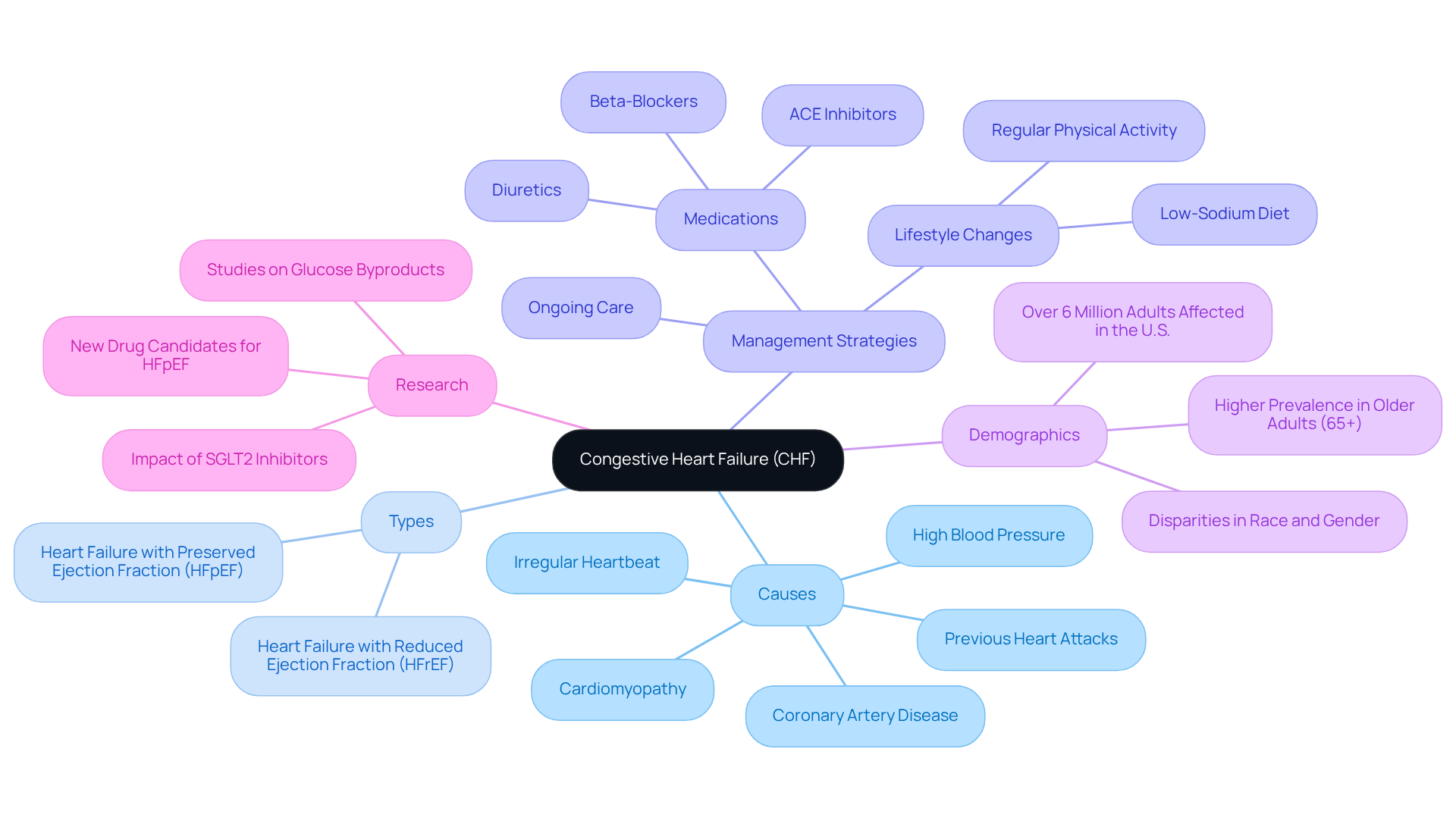
Congestive cardiac insufficiency (CHF) can bring about a range of symptoms that significantly impact daily life, particularly for older individuals. Common signs include:
Patients might also experience:
Symptoms can differ greatly among individuals, especially in the elderly, where they may be mistakenly viewed as normal aging or linked to other health issues. For example, a study revealed that many older adults face fatigue and shortness of breath, which can often be overlooked or dismissed. With approximately 6.7 million Americans currently living with cardiac failure—projected to increase to 8.7 million by 2030—early identification of these symptoms is crucial.
At Amavita Heart and Vascular Health®, we are dedicated to enhancing early detection and management of congestive heart failure treatment through our innovative AI-powered CardioElite™ program. This program offers unique benefits, such as:
This ensures accurate imaging and swift report generation on cardiac structure and function. This enables timely interventions tailored to each individual's needs, especially for those at higher risk due to diabetes, hypertension, or a family history of heart disease.
To effectively manage symptoms, it is essential to keep a diary as part of congestive heart failure treatment. This simple tool allows individuals and caregivers to , fostering improved communication with healthcare providers. By consistently documenting symptoms, timely interventions and adjustments in treatment strategies can be made, ultimately leading to better outcomes. Geriatric specialists emphasize that awareness and proactive management can greatly enhance the quality of life for those undergoing congestive heart failure treatment. As one expert noted, "Identifying symptoms early can enable individuals to take an active role in their care, ensuring they receive the appropriate support and treatment."
Moreover, untreated CHF can result in serious complications, including irregular heartbeat and kidney damage, which underscores the importance of ongoing management and regular follow-ups with healthcare providers for congestive heart failure treatment. By understanding and monitoring symptoms, patients can actively participate in their care, ensuring they receive the necessary support and treatment.
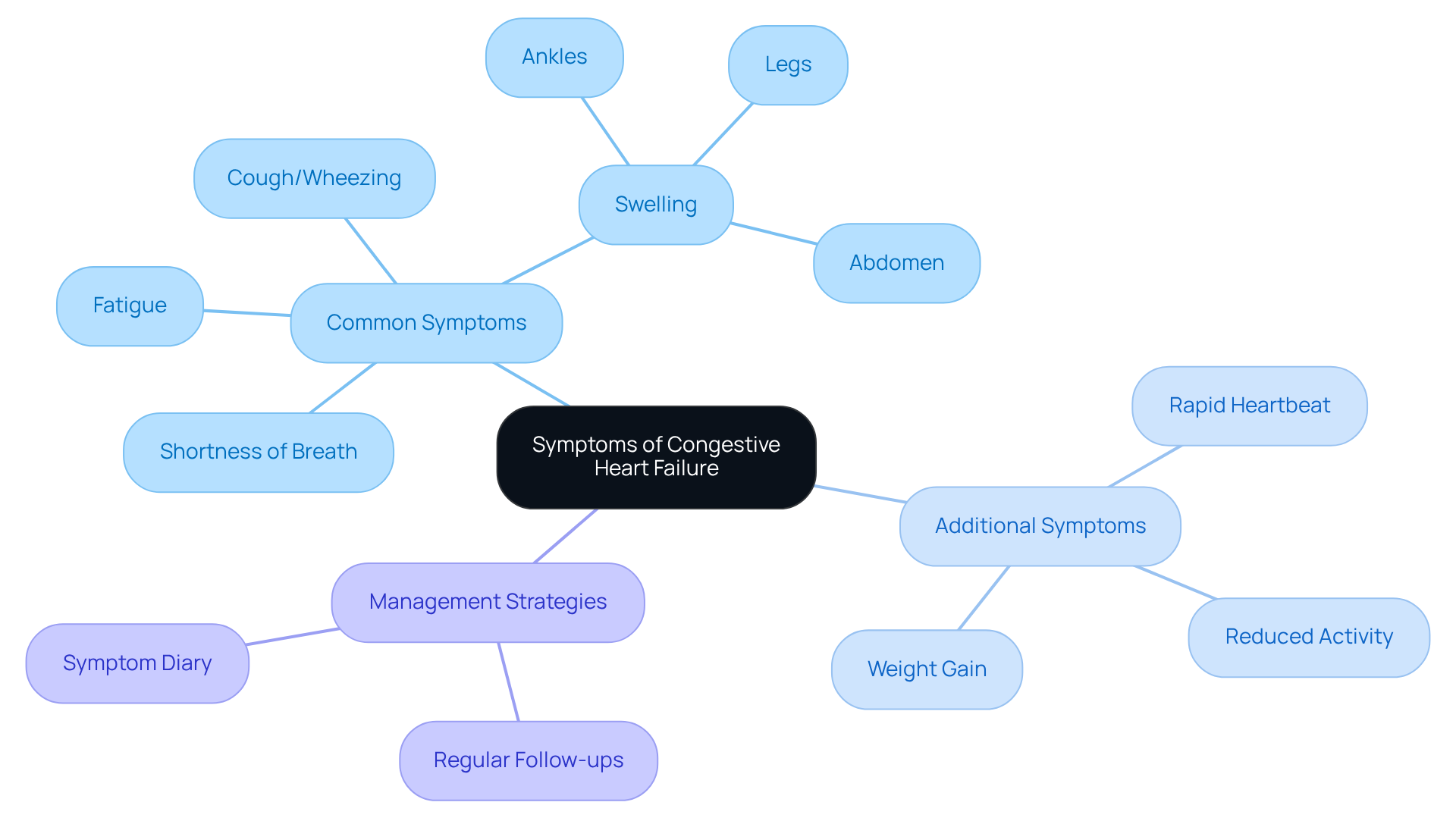
Diagnosing congestive cardiac failure (CHF) can feel overwhelming, but understanding the process can help alleviate some of your concerns. It involves a thorough assessment that includes a review of your medical history, a physical examination, and a series of diagnostic tests designed to provide clarity and support. Among the most pivotal tests are:
The frequency of echocardiograms in identifying cardiac dysfunction is remarkable, with research showing that they are conducted in more than 70% of CHF instances. Cardiologists emphasize the importance of these examinations, asserting that 'echocardiograms are vital for precisely diagnosing cardiac issues and directing treatment choices.' Understanding these diagnostic tools not only reduces anxiety but also empowers you to engage in about your cardiovascular health. Remember, you are not alone in this journey, and there are dedicated professionals ready to support you every step of the way.
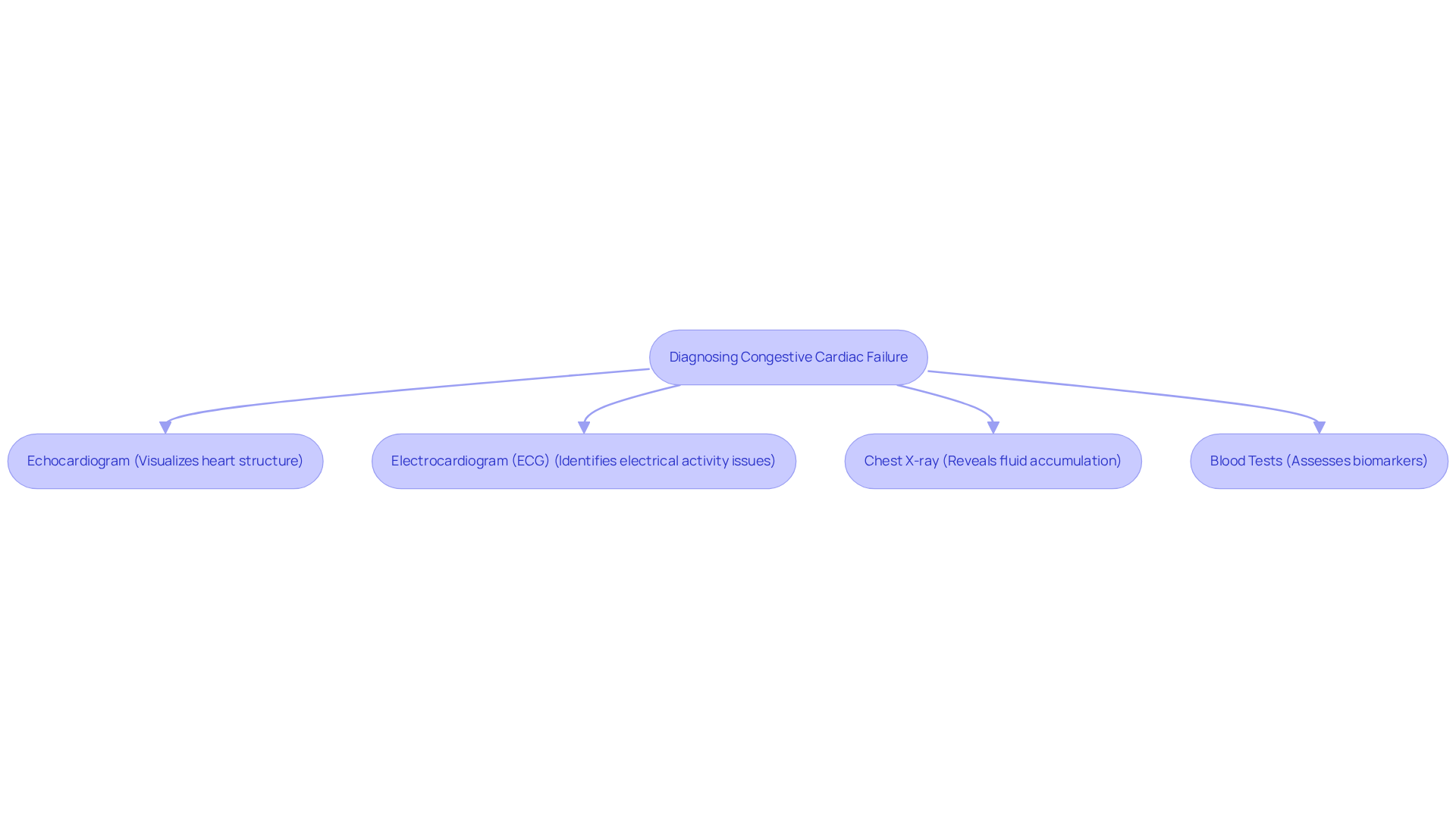
At Amavita Heart and Vascular Health®, we understand that living with congestive heart failure can be challenging. Our approach to congestive heart failure treatment often includes a thoughtful combination of lifestyle modifications, medications, and, in some cases, surgical procedures, all aimed at enhancing your quality of life. We want you to feel supported every step of the way.
Common treatment options include:
At Amavita, we customize every treatment plan, including congestive heart failure treatment, to reflect your overall health, preferences, and specific cardiovascular condition. Our commitment to , along with same-day outpatient procedures, ensures that you receive the best possible support on your journey to improved cardiac health. Remember, you are not alone in this; we are here to help you every step of the way.
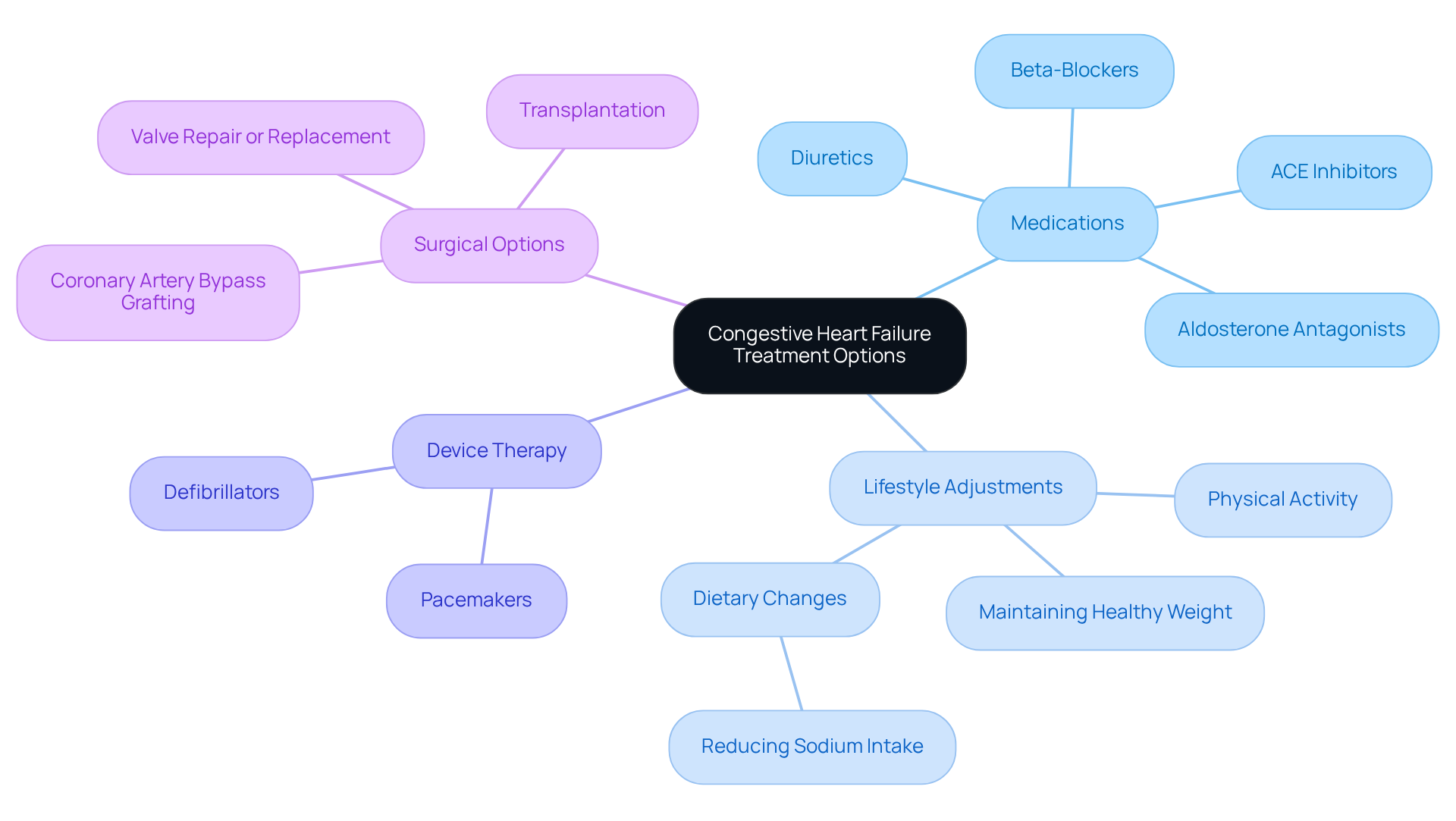
Lifestyle modifications play a vital role in the treatment of congestive heart failure, leading to improved symptoms and a better quality of life. With the compassionate support of Amavita's CardioElite™ program, which offers advanced, real-time diagnostic data and 24/7 cardiology consultation, patients can more effectively embrace these essential changes:
By embracing these lifestyle changes, individuals can significantly improve their ability to manage congestive heart failure and enhance their overall well-being. Real-world experiences illustrate that those who commit to these modifications often report a substantial reduction in symptoms and an improved quality of life, especially when paired with the proactive support of Amavita's CardioElite™ program. Moreover, insights from case studies and the perspectives of internal medicine doctors underscore the effectiveness of the CardioElite™ program in reducing readmissions and improving patient outcomes.
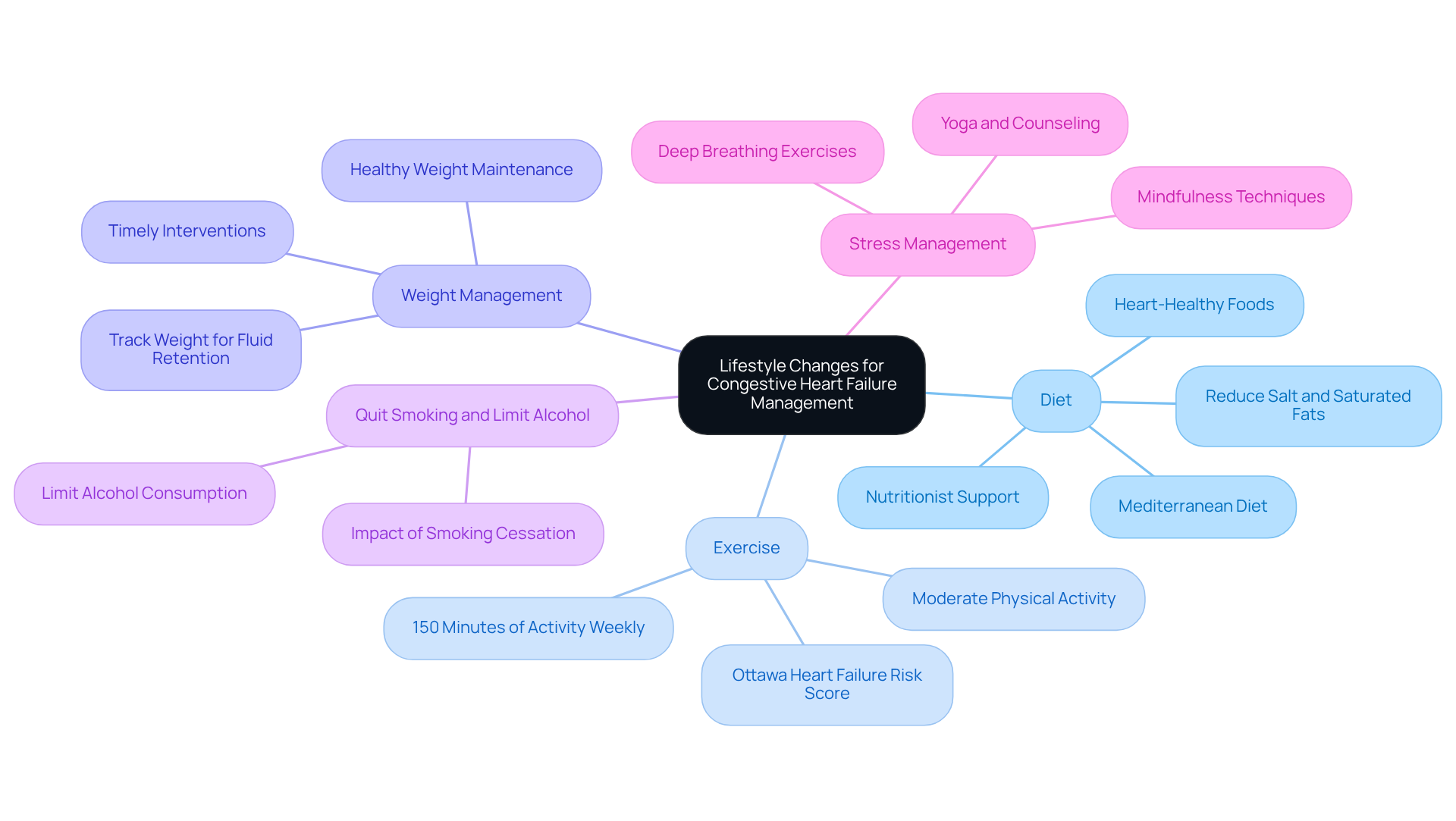
Understanding and managing congestive heart failure (CHF) is essential for enhancing the quality of life for those affected by this intricate condition. A multifaceted approach to treatment not only includes medical interventions but also embraces lifestyle changes that can significantly improve health outcomes. By recognizing the importance of personalized strategies, individuals can take proactive steps in their care journey.
Throughout this article, we have shared key insights regarding:
Furthermore, we explored effective treatment options, ranging from medications to lifestyle modifications, emphasizing the significance of a comprehensive management plan. Innovative support programs, like Amavita's CardioElite™, further empower individuals to navigate this journey with confidence.
Ultimately, the message is clear: proactive management of CHF can lead to enhanced health and well-being. We encourage individuals to engage with healthcare providers, adhere to prescribed treatment plans, and embrace lifestyle changes that promote heart health. By doing so, they can not only manage their symptoms but also reclaim their lives, ensuring they are not alone in this journey toward better cardiovascular health.
What is congestive heart failure (CHF)?
Congestive heart failure (CHF) is a long-term condition where the heart struggles to circulate blood efficiently, leading to fluid buildup in the lungs and other tissues. It can arise from various underlying conditions such as coronary artery disease, high blood pressure, and previous heart attacks.
How is CHF classified?
CHF is typically classified into two primary types: heart failure with reduced ejection fraction (HFrEF) and heart failure with preserved ejection fraction (HFpEF). Each type requires specific management strategies tailored to the individual's situation.
What are the common symptoms of CHF?
Common symptoms of CHF include shortness of breath, fatigue, swelling in the legs, ankles, or abdomen, a persistent cough or wheezing, rapid or irregular heartbeats, reduced capacity for physical activities, and sudden weight gain due to fluid retention.
Why is early identification of CHF symptoms important?
Early identification of CHF symptoms is crucial because many symptoms can be mistaken for normal aging or linked to other health issues, especially in older individuals. Early detection can lead to timely interventions and better management of the condition.
How prevalent is CHF in the United States?
Over 6 million adults in the United States are affected by CHF, particularly among those aged 65 and older. This number is projected to increase to 8.7 million by 2030.
What management strategies are recommended for CHF?
Management strategies for CHF may include adhering to prescribed medications, maintaining a low-sodium diet, engaging in regular physical activity, and utilizing tools like a symptom diary to track daily changes and communicate with healthcare providers.
What is the role of the CardioElite™ program in managing CHF?
The CardioElite™ program at Amavita Heart and Vascular Health® enhances early detection and management of CHF through advanced imaging features and real-time cardiac diagnostics, enabling timely interventions tailored to individual needs.
What are the potential complications of untreated CHF?
Untreated CHF can lead to serious complications, including irregular heartbeat and kidney damage, highlighting the importance of ongoing management and regular follow-ups with healthcare providers.